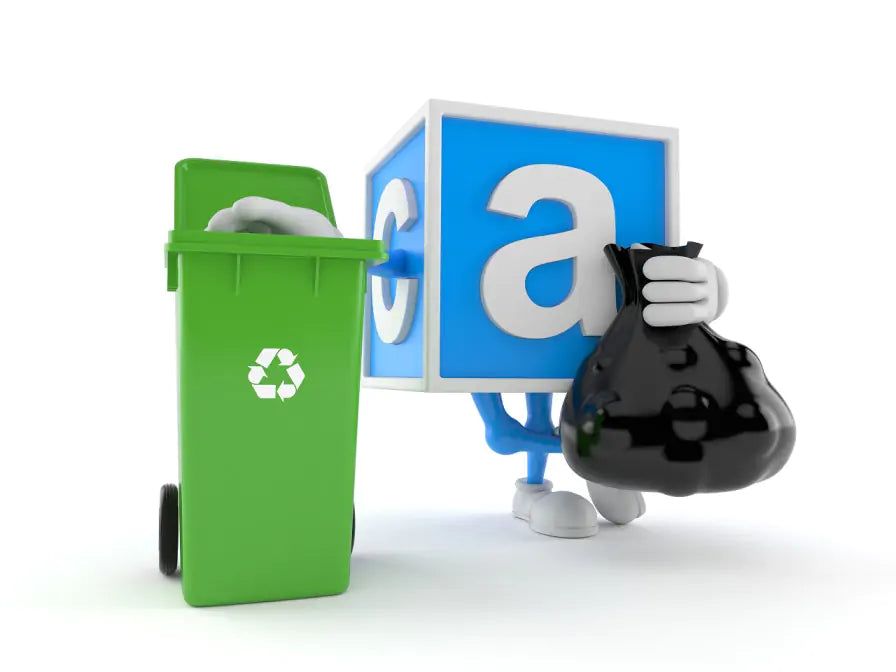OR
Express Checkout

In this series of blogs, we’re going to look at rubbish. From the good, to the bad and downright ugly, we’ll be looking at everything you ever wanted to know, from A right down to Z.

We’ve all seen dumped waste at one time or another. An old mattress dumped in an alleyway, black bags dumped at roadsides, and everything from white goods to car parts strewn across spaces that were once beauty spots.
Not only does dumped waste really spoil the look of an area, it can be a health hazard, as toxins leach into soil and waterways, or when the rubbish contains hazardous or sharp materials.
The extent of fly-tipping in England
More than a million fly-tipping incidents were cleared up by councils in 2016-17 at a cost of £58 million. There were 1,602 prosecutions and 98% of those led to convictions. Taking perpetrators to court cost councils £16.9 million.
The penalties for fly-tipping range from a maximum fixed penalty of £400 to fines of up to £50,000 and a jail term.
Fixed penalties came into effect in May 2016, and councils have the power to decide the penalty, depending on the offence. Fines can range from a minimum of £120 to the £400 maximum.
Most perpetrators end up in the magistrates’ court, where they could face a maximum of 12 months in jail or a fine of £50,000. In 2016, the biggest penalty given by a magistrates’ court was handed to a meat and poultry business in Birmingham. It was fined a cool £25,500 for fly-tipping offences.
What do councils spend the income they make from fines on?
There are guidelines on what the money can be spent on, and it’s usually spent on dealing with litter, dog fouling, graffiti, and fly-posting.
What’s behind the incessant rise in fly-tipping incidents?
Are the increasing amounts that councils charge for taking rubbish to the tip leading to an increase in fly-tipping? The Local Government Association says no, but we can’t ignore the fact that out of the 10 local authorities in England that have seen the greatest increases in fly-tipping, six of those charge people to take rubbish to the tip, especially construction and DIY waste.
Where are the fly-tipping hotspots?
Fareham, Basingstoke, and Deane-charges are imposed at tips for plasterboard, soil, and rubble.
Craven (North Yorkshire)-charges are imposed for hardcore, rubble, plasterboard, tires, and DIY waste.
Newcastle-under-Lyme and South Staffordshire- South Staffordshire Council maintains that charges are not behind the rise in fly-tipping. It suggests that the way incidents are recorded has changed, which may account for the increase.
What can I do about my waste?
Bulky waste
Most councils have a collection service for this and charges will most likely apply, depending on what you’re getting rid of.
Garden waste
Many councils offer a paid collection service, though if it’s not available in your area, you can still take it to a local rubbish tip or make a compost heap or bin at home.
Business waste
You must dispose of your waste properly with a licensed and registered waste carrier, otherwise you have no way of knowing if your waste is being disposed of properly. Otherwise, if you want to arrange disposal yourself, you must take the waste to a tip of landfill with a commercial waste licence. Fees and taxes will apply.
I own land-what can I do if someone fly-tips on it?
The first thing to know is that if it’s your land, you are responsible for clearing up the rubbish and disposing of it properly. Report it to your local authority or the Environment Agency, who may or may not help clear it up (at the very least, they will instruct you on how to dispose of it safely and correctly and may investigate and prosecute offenders.) You are liable for any costs involved in clearing up the rubbish and disposing of it, but in the event of a prosecution, you might be able to get them reimbursed.
After you’ve experienced an incident like this, it might help to think about why your land was targeted and take measures to make it more secure/less desirable to potential fly-tippers.
How do I report fly-tipping?
If you see someone dumping rubbish or you want to report an incident that has already happened, note down:
It’s not a good idea to approach people who are dumping waste, you might end up putting your safety at risk. Instead, call your local authority (most will have a fly-tipping hotline-check their website for details) or the Environment Agency on 0800 807 060.
Local authorities will deal with small fly-tipping incidents while the environment agency will deal with larger, more serious cases of waste dumping, particularly where hazardous waste is involved.